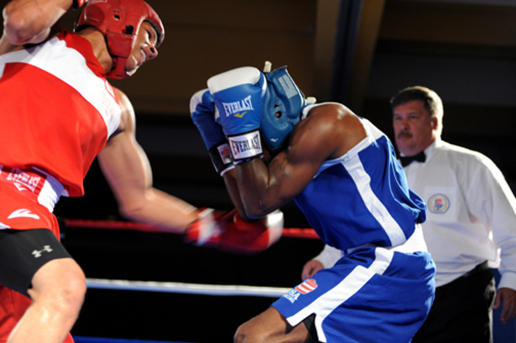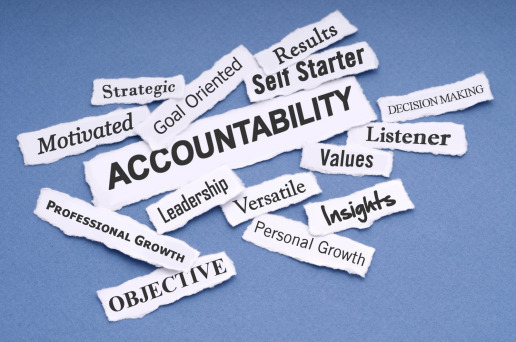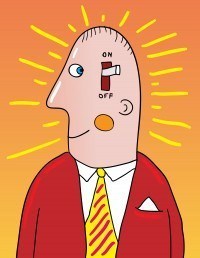Lee Ellis's Blog, page 347
July 30, 2013
“One of the Toughest Men I’ve Ever Known” – A Tribute to Former POW Bud Day
There is always something new to learn when reflecting on the life and passing of another person, but today’s tribute is no ordinary person.
Today, we honor and remember fellow Vietnam POW, Col. George E. “Bud” Day USAF (Ret), who recently passed away on July 27th, 2013. He was one of our nation’s most decorated service members and earned more than 70 medals during World War II, the Korean War and the Vietnam War, where he received the Medal of Honor, the nation’s highest award for valor.
He spent 5 ½ years as a POW with Lee Ellis and their comrades. In a recent statement, Lee said, “I worked with Bud over enemy territory when he was an F-100 Misty FAC and I was flying the F-4. He was clearly a courageous guy. Then we met in the Hanoi Hilton–the worst of times. Since then, we have celebrated freedom and friendship for forty years in the best of times. Bud was a unique individual–a bulldog, tough as nails, blunt and feisty, and yet he had a soft heart, strong faith, and lived life to the fullest. He was blessed to have his wife, Dorrie, a wonderful gem standing beside him all those many years. We lost a great American and one of our most courageous warriors ever.”
These same sentiments were also mentioned by POW cellmate, Senator John McCain, “I owe my life to Bud, and much of what I know about character and patriotism. He was the bravest man I ever knew, and his fierce resistance and resolute leadership set the example for us in prison of how to return home with honor. … I will miss him terribly.”
After his release, Day retired to the Florida Panhandle in 1977 and practiced law, becoming a crusader for veterans’ health care benefits. He took his fight to the U.S. Supreme Court in a 2003 lawsuit that alleged the government reneged on its promise to provide free lifetime health care to hundreds of thousands of Korean and World War II veterans.
Please take a moment to read this extended article and be challenged and inspired by Col. Day’s life and legacy, and share your thoughts –
Article – Sioux City Journal
Article – Atlanta Journal-Constitution


July 24, 2013
Lee’s Latest Book Recommendation – “Eyes on the Horizon” – Read Why
Published in 2010, ‘Eyes on the Horizon’ shares the stories and thoughts of the Former Chairman of the Joints Chiefs of Staff, General Richard B. Myers, during the critical four years following September 11. Then, he proposes a bold new plan to prepare America for the diverse national security challenges of the twenty-first century.
General Myers talks candidly about his career in the military, the unforgettable events of September 11, and the global war on terror. Myers believes that America has misidentified its adversary, focusing too narrowly on tactical battles instead of on a long-range strategy that will overcome a global insurgency. Rather than mandate what Islam should become, we must work with an international community that includes responsible non-Western states to protect against the behaviors we consider universally unacceptable—especially those that promote violence. Finally, Myers maintains we must integrate our own government agencies so that we can focus a sustained approach to this strategy.
What kind of leadership and character does it take to lead an effort like this one? Have you read this book? If so, please share your comments!
Click here to learn more about “Eyes on the Horizon.”


July 23, 2013
Interview with an American Hero
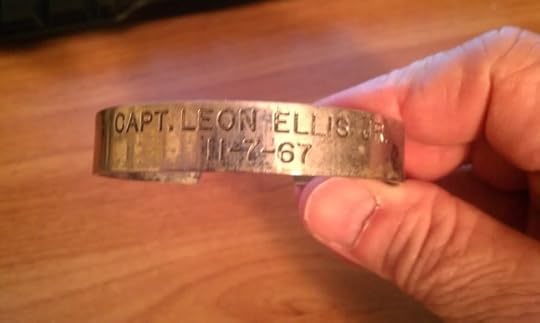



This story began in 1970 when I was ten-years-old.
I purchased a P.O.W. bracelet, which I still have. About a year ago, a friend suggested I try to locate the man named on the bracelet...
Not only did I try, I succeeded.
Captain Leon Ellis, as he is named on my bracelet, and I exchanged several emails and as it turns out, he has gone on to do amazing things with his life.
Extremely grateful for people like Tim who invested time, energy, leadership, and thoughtfulness to raise awareness. Anyone--regardless of age--can make an impact in their sphere of influence.
July 18, 2013
Are Marketing Miscues Preventing You From Living the Dream? A Leadership Radio Interview with Louis Dillard
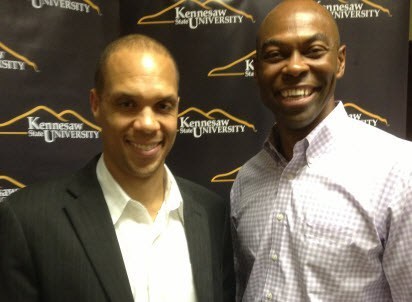
Radio guest Louis Dillard stands with Global Leader Radio host, Miles.
Louis Dillard, President & CEO of Zero to Infinity, recently shared that ‘Leading with Honor’ has been the book that has most impacted his leadership ability. What a humbling honor! He has shares his personal story of dreaming, doing the right kind of marketing in business, and his personal style of leadership in his company, Zero to Infinity.
Check out his recent radio interview below on Global Leader Radio, and share your thoughts.


July 16, 2013
Leaders–Can Over-Communication Be Taken Too Far? Watch This Short Interview from Lee Ellis
In the context of leadership, watch Lee’s thoughts on the importance of over-communicating. How do you over-communicate when leading your team—whether it’s work, home, or community?
One key comment from the interview is “In the Vietnam POW camps, we would risk our lives to stay in touch with each other. How equally important it is for teams and organizations to deliberately communicate beyond what is adequate.”
Related Article: Fight for Clarity
Register for e-Updates from Lee Ellis.


July 15, 2013
Fighting to Win in Leadership (Part 2) – How to Get There
(Editor’s Note: We featured Part 1 of this article in January 2013 and intentionally waited until the middle of the year to post this second post. We encourage you to reflect on the time that has passed this year and evaluate how you’ve fought to win this year. This article is an excerpt from Chapter 5 in Lee’s book, Leading with Honor.)
Other personality styles focus their drive on a more limited set of goals. For example, some athletes are extremely competitive when engaging in their sport, but are not so driven in other areas. I witnessed this a few years ago while providing career coaching to professional athletes who were approaching retirement. One All-Pro NFL football player was a fierce competitor on the field, but he was relaxed and somewhat laid back when engaged in other activities. His drive to win centered on his passion for the game. It was fueled by his desire to be the best in his field.
On another consulting assignment where I was asked to assess the personality traits of various store managers, I encountered one leader who measured quite low in the area of drive. She was very successful on the job, however, so we dug deeper. It turned out that her drive came from a strong motivation in two seemingly unrelated areas: to provide great customer service and to creatively present innovative products and services.
Driving Dominant Personalities
In some individuals this pioneering drive is a dominant personality trait that affects broad areas of their lives; these people will fight to win at every undertaking. Others who might be world-class performers in their profession might have that same kind of fight in only a few endeavors; it’s just the way they are wired. Good leaders have a knack for identifying the sources of each individual’s unique drive to win, and then tapping into it for the benefit of the organization and the individual.
“Good leaders have a knack for identifying the sources of each individual’s unique drive to win, and then tapping into it for the benefit of the organization and the individual.”
Fighter pilots by nature are competitive. They have to be, because they’re trained to engage in life-and-death combat. But in most work environments, ultra-high competitiveness is counterproductive. “Fighting” needs to fit the environment and the situation. In all organizations, striving to win at the expense of others is a losing proposition. An insatiable need to always be right and win every argument can derail relationships and even careers.
Fight for Win-Win Outcomes
On several occasions I’ve been asked to coach executives who were outstanding in almost every way, except they had excessive drive. Some were so dominant they could not cooperate with their teammates, and at times they even bucked their boss. They made a habit of turning discussions about minor issues into arguments. These individuals were good people with good intentions, but they could not see that their behaviors were out of balance. My job was to help them become aware in the moment of the situational dynamics, so they could then learn to manage their interactions in a successful way.
I’ll never forget one individual who called to tell me about his success. He said that after a staff meeting one of his peers came to him and asked him if he was feeling okay.
He replied, “Sure, why do you ask?”
His peer responded, “You were not yourself today in the meeting. You were quieter than usual and didn’t get into any arguments.”
My client was quite proud of his achievements, and so was I. He didn’t reinvent himself, but he did learn to manage his natural drive to win. His career has continued upward, and he now manages a large segment of a Fortune 100 company.
Check Your Motives
Drive is a helpful quality, but like most other leadership traits, it can be powered by inappropriate motivations. When individuals allow unbridled ambition, greed, or other unhealthy needs to fuel their desire to win, the results are almost invariably destructive for that person and for the organization. Legitimate needs and worthwhile goals are seldom met when “steamroller” methods are used to pursue selfish desires. When fighting to win, know when to fight. Sometimes you have to withdraw from the battle for a while. As POWs, there came a time during torture when it was evident we could not beat them at their game. We had to find a different approach for achieving our goals. When you know for sure you can’t win, it’s probably time to quit doing what you’re doing and rethink your strategy. But before throwing in the towel, check with your teammates, your mentor, or others you trust to get their counsel. And, keep in mind the “First Law of Holes: When you’re in one, stop digging!”
“When you know for sure you can’t win, it’s probably time to quit doing what you’re doing and rethink your strategy.”
Outstanding leaders seek to understand the true nature of their own motivations and the motivations of those they lead, and then they make adjustments as necessary. As Jim Collins points out in his bestselling book Good to Great, the best leaders are typically highly competitive, but they harness that competitiveness for the good of the organization, not to boost their own egos.
Are your drive and ambition focused on helping the team succeed? Does your drive to win interfere with your relationships? If your drive is too intense or too weak, in what ways might you be hurting the team? How could you find out how you are affecting others? Share your thoughts.
LE
Article Series Link: Fighting to Win (Part 1)
——————–
Lee Ellis is Founder & President of Leadership Freedom LLC® & FreedomStar Media™.
He is a leadership consultant and expert in teambuilding, executive development & assessments
Email | LinkedIn | Web | Blog | Book | Facebook | Twitter
He is the author of Leading with Honor : Leadership Lessons from the Hanoi Hilton


July 10, 2013
Ask Lee Your Question on the Topic of Accountability – Contact Details Enclosed
We need your help! The topic of accountability is consistently one of the most popular topics that Lee is asked in his travel and speaking. So, he’s currently writing his next book on this topic.
We’d like to feature your accountability question in this book, so please send us your questions.
Do you want to know the true definition of accountability? Why did your last attempt at being accountable to a colleague not work?
Reply as a comment to this blog post, or fill out the form below.
Thank you!
[contact-form]


July 9, 2013
The 5 Ways to Spot an Emotionally Intelligent Leader
(Editor’s Note: From time to time, we want to feature blog articles from other authors that highlight a particular issue related to leadership and personal development.)
Research has shown us that more than 90 percent of top leadership performers have a high amount of emotional intelligence, or EI.
The higher up the ladder that leaders are, the more people they impact and their EI becomes increasingly important. The person at the top sets the atmosphere that permeates the organization, including the emotional temperature.
Not only does a leader with low emotional intelligence have a negative impact on employee morale, it directly impacts staff retention. We know that the biggest reason that people give for leaving an organization is the relationship with those above them.
Here are five ways to spot an emotionally intelligent leader:
1. Non defensive and open
Insecure leaders that demonstrate low EI become defensive and take it personally whenever they encounter anything that appears to them as criticism and a challenge to their authority.
“A secure leader with a healthy dose of emotional intelligence strives to listen, understand and find out what is behind behaviors and actions of those they are responsible for managing.”
A secure leader with a healthy dose of emotional intelligence strives to listen, understand and find out what is behind behaviors and actions of those they are responsible for managing. They listen before they respond and if they don’t understand something ask open ended questions that are meant to gather more information.
As opposed to leaders with low emotional intelligence, they don’t make it about them, but look for ways to make the situation better for everyone involved.
2. Aware of their own emotions
Leaders who are oblivious to their own emotions and how they are impacted by them have no awareness of how their words and actions affect others. This can have a very devastating effect on staff morale and lower productivity.
Highly emotionally intelligent leaders are aware of strong emotions and avoid speaking out of anger and frustration. If they feel the urge to give in to strong emotions in their interactions with others, they give themselves a time out, waiting until their emotions have leveled off and they have had a chance to think about the situation.
3. Adept at picking up on the emotional state of others
A skilled and empathetic leader that is aware of other’s emotions is able to use that awareness to develop stronger relationships with those they manage. Even if delivering bad news, they are able to cushion the impact by simply letting the receiver know that they are aware of how they might be feeling.
Leaders with high EI are able to put themselves in place of the person receiving criticism or negative feedback, allowing them to give it in a way that might be more beneficial and less destructive.
4. Available for those reporting to them
Good leaders make themselves available to those reporting to them both physically and emotionally. They are responsive to the fact that there will be times that those reporting to them will be having difficulties outside of work that will impact them.
“Good leaders make themselves available to those reporting to them both physically and emotionally.”
Death of family members, friends, relationship breakdowns and all sorts of life crisis will affect virtually everyone at work at times. Emotionally open and secure leaders understand are there for support during these times.
5. Able to check their ego and allow others to shine
While possessing self-confidence, high EI leaders do not have a need to demonstrate their own importance or value.
They chose their words carefully and speak and act out of concern for their staff, and the health of the organization. They do not have the need to have their ego massaged and are not looking for ways to take credit for the work of others.
Understanding that people work better when they feel appreciated, they are always looking for ways to show give positive feedback and rewards for a job well done. Secure in their own abilities, they are not threatened by those under them and actively seek to help them work to the best of their capabilities and rise up the organization.
HD
Do you agree with Harvey’s article? And, do you believe that leaders with high EI are properly rewarded and/or promoted? Please share your comments.
Related Article: “You Know You’re Smart, but What About Your Emotional Intelligence?”
~~~~~~
Harvey Deutschendorf is an emotional intelligence expert and internationally published author of THE OTHER KIND OF SMART, Simple Ways to Boost Your Emotional Intelligence for Greater Personal Effectiveness and Success published by the American Management Association of New York. He has an extensive background in career development and social work, and is certified to administer the Bar-On EQI, the first scientifically valid test for emotional intelligence that has been approved by the American Psychological Association.


July 2, 2013
Faith and Courage: Close Allies in Authentic Leadership – Watch the Video
Lee speaks on the InTouch program entitled “The Price of Freedom”
Lee Ellis was invited to speak on InTouch with Dr. Charles Stanley recently. In honor of the Independence Day Week, we wanted to share this message with you, too.
In addition to Lee’s strong call to faith and courage as elements of authentic leadership, this segment also features several veterans including Sgt First Class SFC Cedric King who shares an emotional story of his injuries while serving in Afghanistan.
Click the image above to watch, or click here.
Effectively engaging as a courageous leader ultimately requires the elements of respect, love, confidence, hope, and faith. After watching this program, we invite to learn more about the Leading with Honor Courage Challenge that provides free advice, resources, and tools to help you.


July 1, 2013
Leaders and Difficult Decisions: How Do You Handle Syrian Crisis Scenarios?

Image Source: Telegraph.Co.UK
Hard choices come with the job of a leader. Imagine almost 1 million Americans dying in a modern American civil war over the last two years, comparatively speaking. That is the ratio of people that have died in the current debacle in Syria—many of them innocents caught amid the violence.* It’s a tangible example of the difficult choices regarding how deeply America should be involved in this conflict.
Our President and national leaders are facing a situation where there doesn’t appear to be many good choices. We don’t want to help Assad and his terror-sponsoring regime, but the situation has deteriorated to the point where terrorists have taken over the fight for the opposing rebels in many areas.
“This dilemma of having to choose a best path when there doesn’t seem to be any good choices isn’t that unusual for leaders—or even individuals and families for that matter.”
The Syrian crisis is a good case study for building a model for making tough decisions. This dilemma of having to choose a best path when there doesn’t seem to be any good choices isn’t that unusual for leaders—or even individuals and families for that matter. I’ll initiate some thoughts and best practices, and then you the readers can critique and improve. Let’s see if we can actually come up with something that will help all of us, and who knows—maybe even be helpful to those who drink that funny water inside the DC beltway.
Check Your Mindset.
Mindsets drive behaviors which have either positive or negative outcomes, and mindsets are based on assumptions. For example, facing tough decisions like this, I must assume that I don’t know everything that needs to go into the decision; so, I need the wisdom, knowledge, and experience of others who have relevant information and expertise on the subject. Getting the full picture will help objectively evaluate the various courses of action. This step also assumes that the decision-maker is willing to listen to diverse opinions and withhold judgment until appropriate information has been gathered and all advisors have been heard.
Get Everyone to Put on the “Big Hat.”
This means putting the needs/mission of the highest level of the organization first over individual parochial and political interests. I’ve heard the CEO of a Fortune 500 company lament that this was the biggest challenge with his management team of division presidents. They had problems taking off their division hat for the sake of the greater mission. If it’s true in business, imagine how much more so in government cabinets and congressional political parties. Complex, difficult decisions require a deft self-awareness of your personal motives and natural biases. If you can objectively make the best difficult decision—even when it may not benefit you personally—that is a hallmark of true sacrificial and honorable leadership.
Establish Ground Rules for the Management Team.
What is okay and what is not okay? How will we stay focused on the main thing? And, if I’m the senior leader, I make it clear that we need courage to speak up with dissent; there is no benefit from having “yes men/women” who won’t give their true opinion. And again, clarify your assumptions. A team that can have passionate, courageous debate (or as Patrick Lencioni calls it—“creative conflict”) is almost always a better environment for good decision-making.
Identify Your Sources of Counsel.
Start with your key managers and advisors. Decide if you need input from professional experts like a lawyer, CPA, engineer, or other specialist. Above all, get counsel from a diverse group and listen to them.
Clarify the Various Options.
Which choices will best serve your highest aim/goal—whether it’s an organization or the ideals of a particular country or culture? What are the most likely outcomes with each? What are the potential unintended consequences? Play each option out as best you can to see the end results.
Courageously Make a Decision.
Since we said it’s a hard decision with not many good choices, it will take courage to decide and move ahead. Courage means making the right decision even when it doesn’t feel natural or safe. Overcoming fears to do what you know is right will enable you to courageously make a decision, and following the previous steps will help you make the best one.
Stay United and Execute the Decision.
Make sure that you have a unified message and communicate it to the lowest level of the organization. Everyone should understand the logic you used and remind the team of the principle of unity (we have done our best and we all own this decision). Anything less is disloyalty and undermines the success of the organization.
These are my ideas, so how do you see it? What has been your experience? What worked and what didn’t? Please share your thoughts.
LE
Recent Article Reference – “Syrian Civil War: How Did We Get Here?” – http://www.diplomaticourier.com/news/topics/security/1498
*Source: http://www.cnn.com/2013/01/08/world/meast/syria-civil-war-compare
——————–
Lee Ellis is Founder & President of Leadership Freedom LLC® & FreedomStar Media™.
He is a leadership consultant and expert in teambuilding, executive development & assessments
Email | LinkedIn | Web | Blog | Book | Facebook | Twitter
He is the author of Leading with Honor : Leadership Lessons from the Hanoi Hilton






